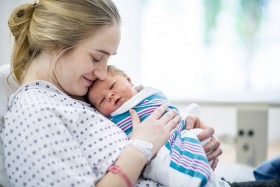Concerns About COVID-19 and Birth Trauma

The coronavirus pandemic has brought an immense amount of uncertainty into the world, whether it’s about the economy, job security, vacation plans, just to name a few. But while it feels like COVID-19 has brought the entire world to a standstill, it’s easy to lose sight of the fact that life is still carrying on in many ways, including the fact that babies are still being born during this very tumultuous time.
Under the best of circumstances, it’s very common for expectant mothers to have a lot of anxiety about protecting the health of their child. Facing the prospect of giving birth in the midst of a global pandemic, very understandably, makes matters even more stressful.
Unfortunately, since we’re currently still in the process of learning about COVID-19 and its long-term effects, it’s difficult to know exactly how it impacts pregnant women and their babies. While there have been some reports of COVID-19 in newborns, it’s not necessarily clear how exactly it was transmitted to the child. The World Health Organization states that, at this time, they do not know if the virus can be passed on to the baby during pregnancy, delivery, or through breastmilk.
However, WHO also notes that since bodies change so much during pregnancy, pregnant women can be particularly susceptible to some types of respiratory infections so it’s very important for them to take precautions to protect themselves from COVID-19. If a pregnant woman is showing symptoms of COVID-19, WHO recommends that they be prioritized for testing since they may need special care if they test positive.
During this time, hospitals are taking extra steps to protect their patients in maternity wards, such as by limiting visitors and how many people are allowed to be present during delivery. But as hospitals become overwhelmed with coronavirus patients and reports grow about nurses and doctors facing shortages of protective gear, many expectant mothers have been rethinking their initial birth plans. Many women who had been planning to deliver in a hospital have started considering options like home births and birthing centers instead.
Regardless of where you choose to give birth, it’s important that your doctor help you understand the risks involved with each option. For example, birthing centers and home births are best suited for women with low-risk pregnancies since things like certain types of maternal health conditions may require more medical intervention. If you are considering an independent birthing center, be sure to ask about their relationships with nearby hospitals so that you know what they can do if there are complications with your delivery. If you’d like to work with a midwife for a home birth, learn about important questions to ask, like whether or not they have hospital admitting privileges, how many births they’ve attended to have resulted in a transfer to the hospital, and if they have experience or training to handle breech deliveries.
If your child tests positive for coronavirus shortly after delivery and they seem to have been harmed in some way, it’s important to get in touch with a birth trauma lawyer. Birth trauma cases can be very complex and a lawyer will be able to help you better understand how the law applies to your case. Many birth trauma cases are ultimately cases of medical malpractice and if your child has been harmed, they might try to argue that they couldn’t have known how to handle it. However, depending on the circumstances of your case, they may have been able to do more. At Goodwin & Scieszka, we’re experienced in handling Michigan birth trauma cases and can help answer your questions. Even if your child is a few years old, you may still have legal options. Contact us today to get started.
Image: iStock / FatCamera






